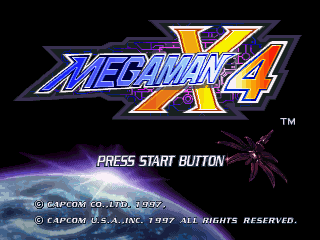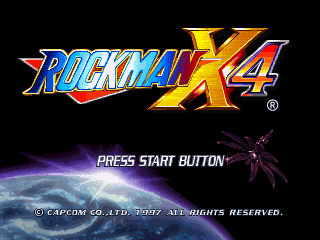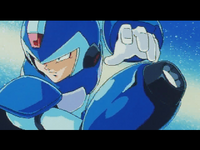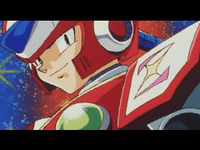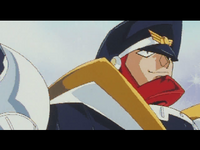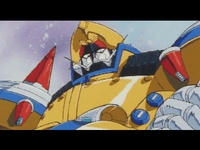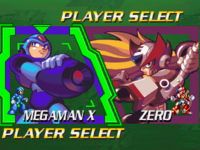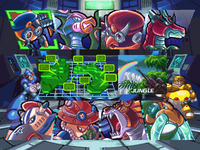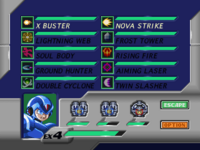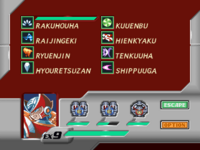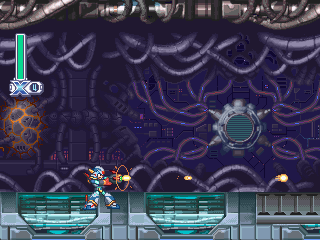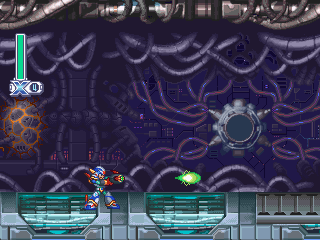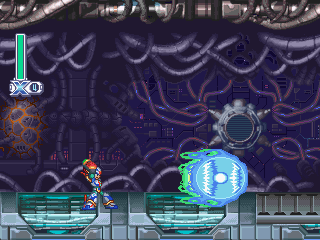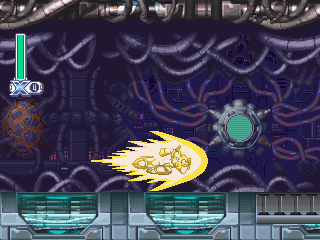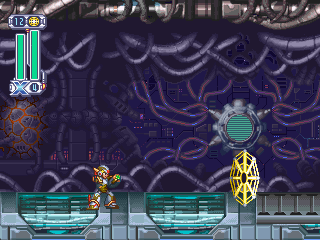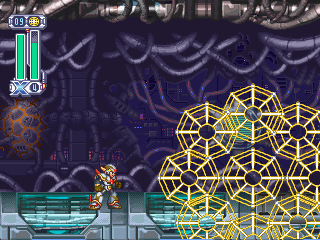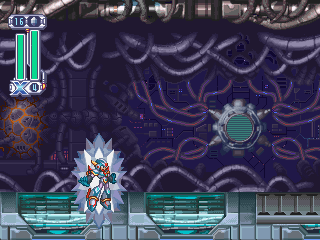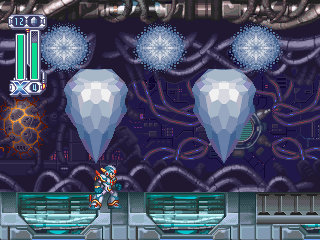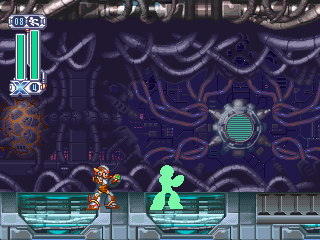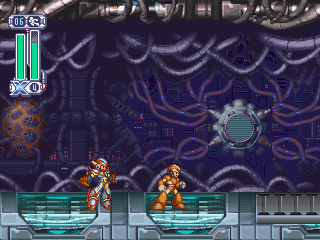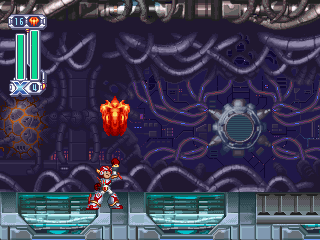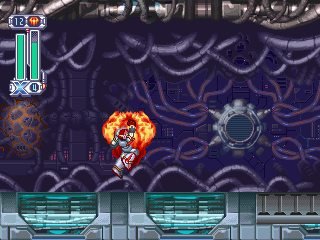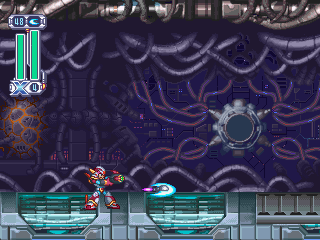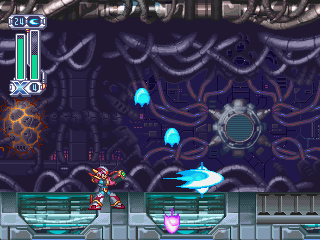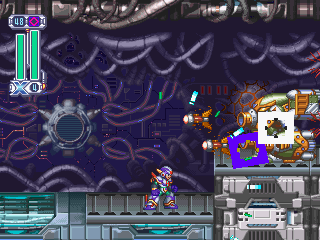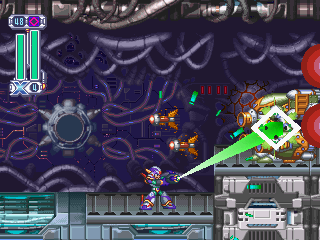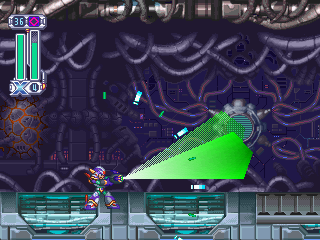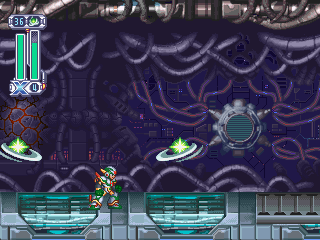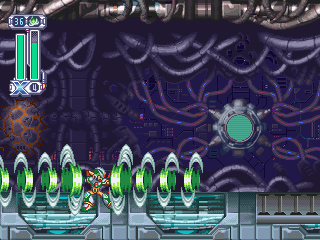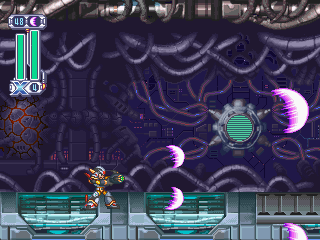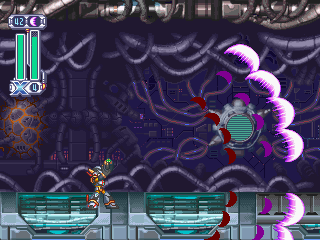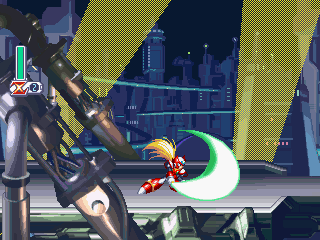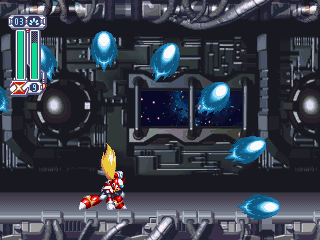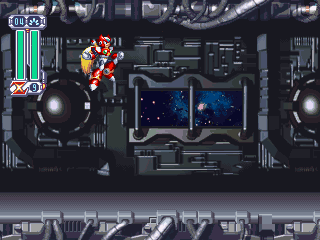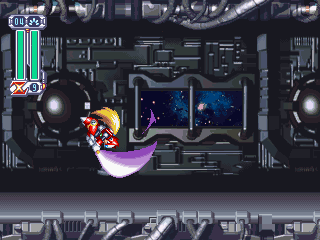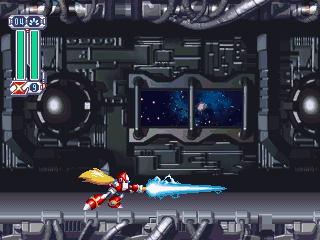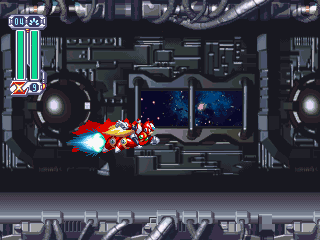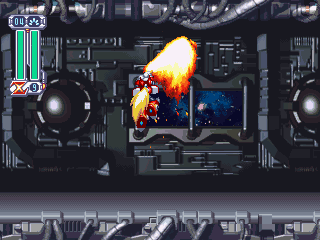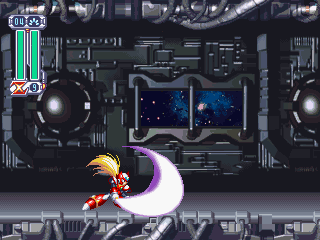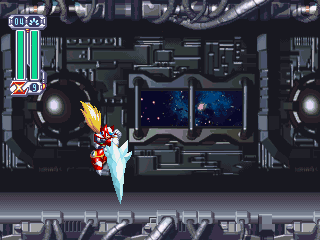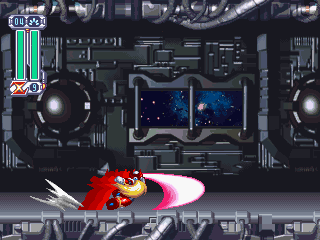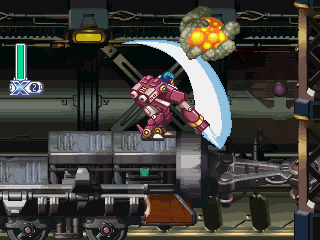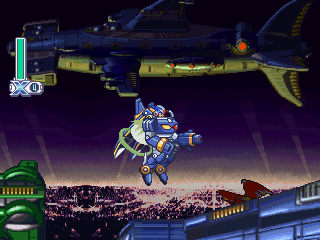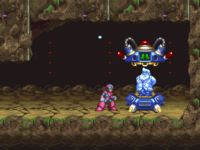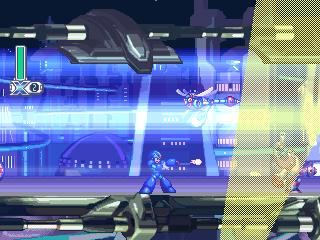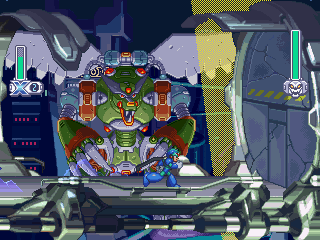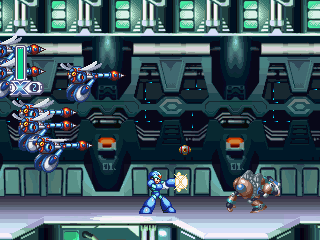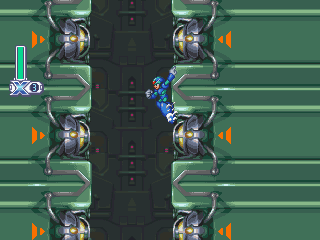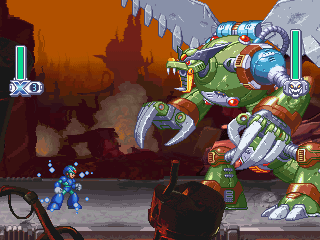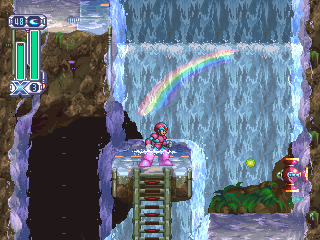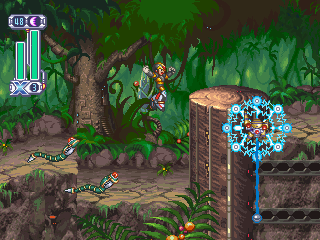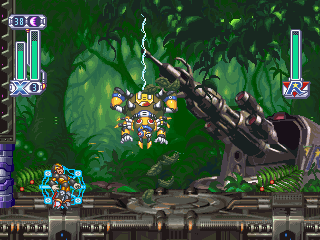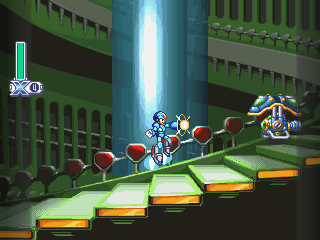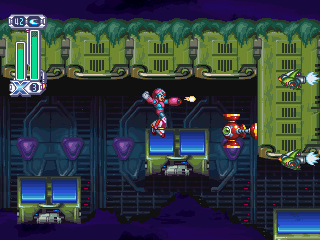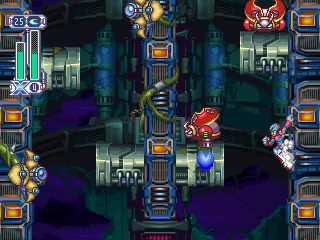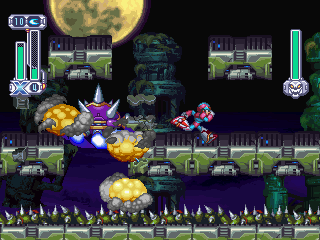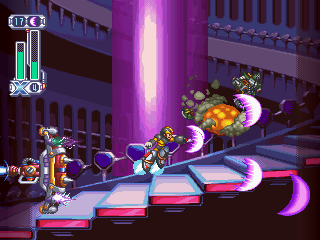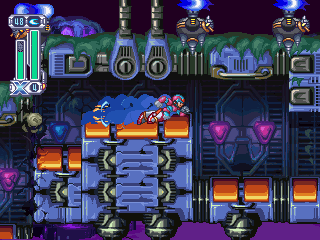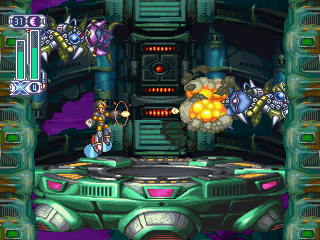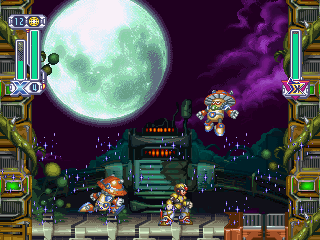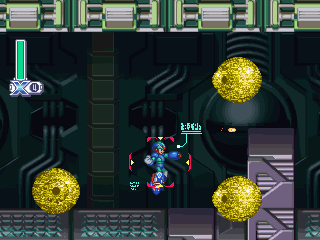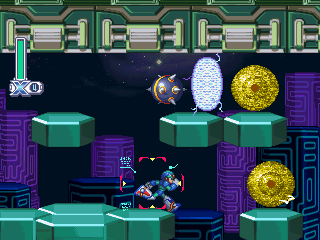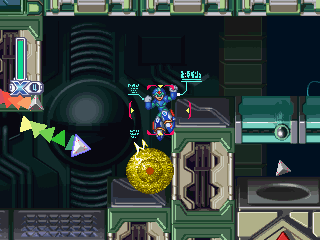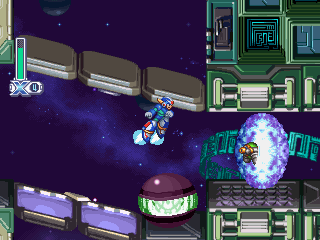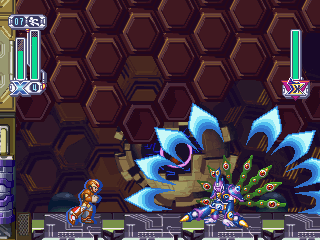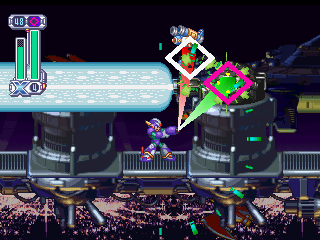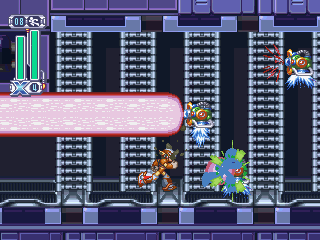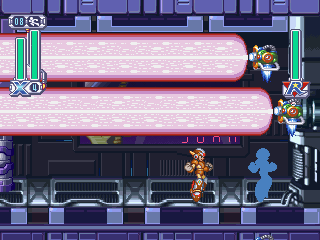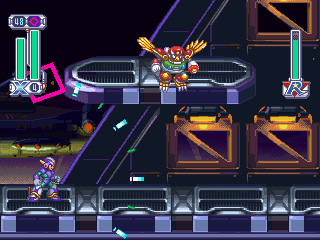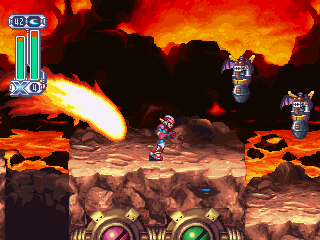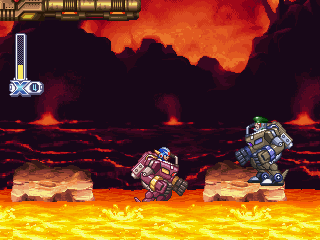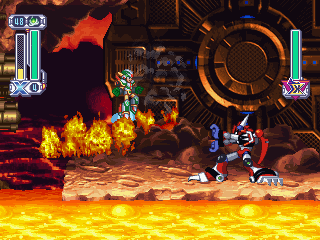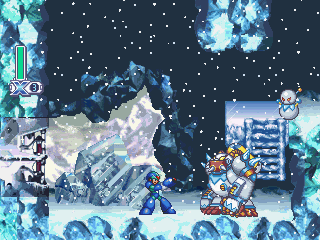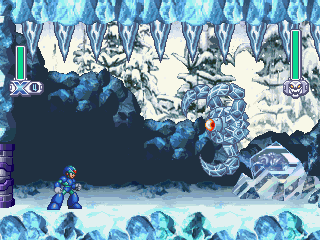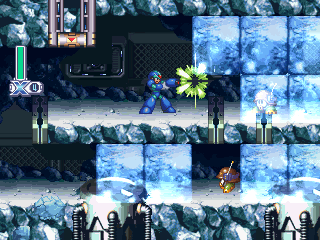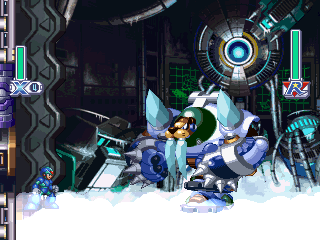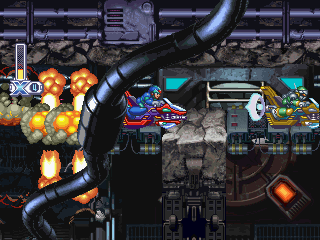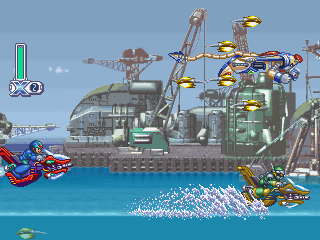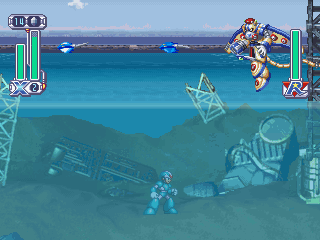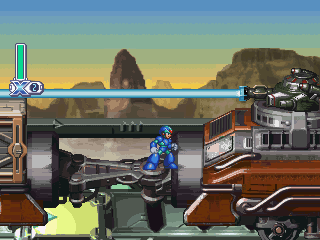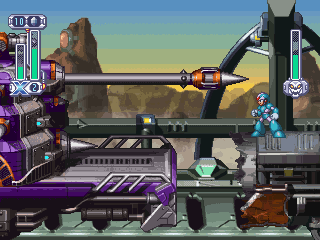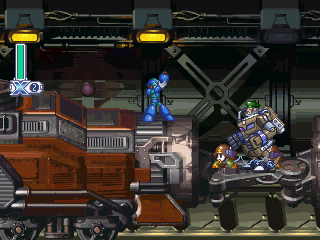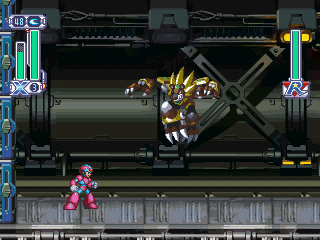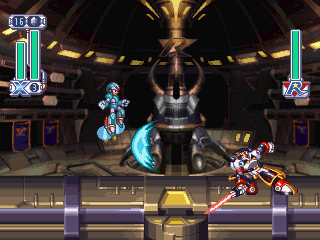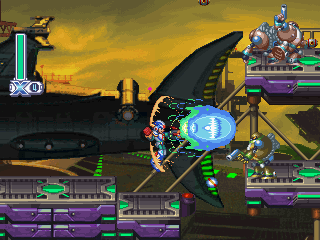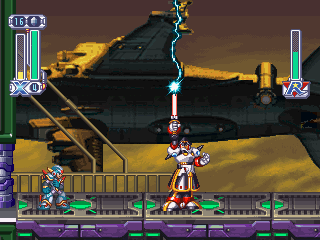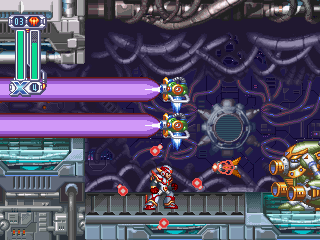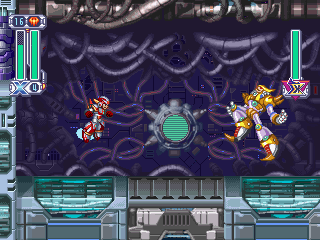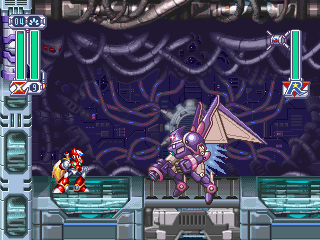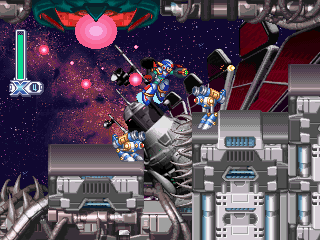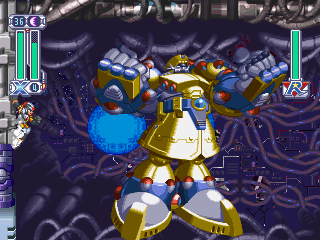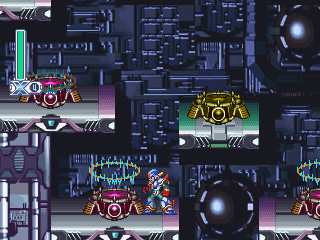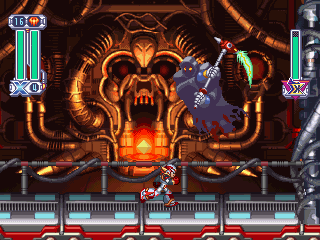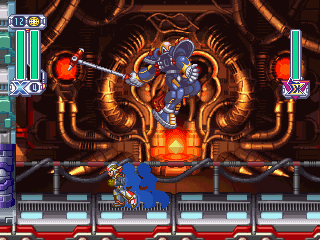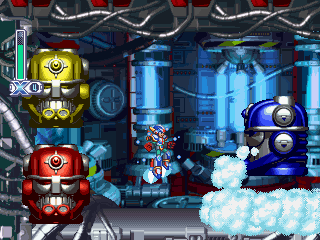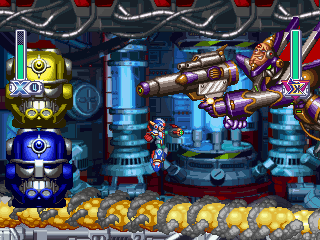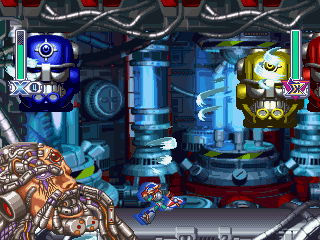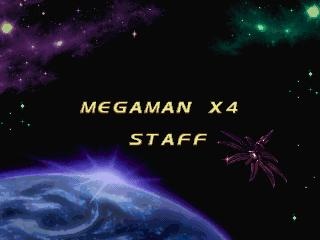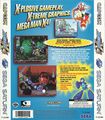Difference between revisions of "Mega Man X4"
From Sega Retro
Hyperspeed34 (talk | contribs) |
|||
| (One intermediate revision by the same user not shown) | |||
| Line 568: | Line 568: | ||
*'''Music:''' Toshihiko Horiyama | *'''Music:''' Toshihiko Horiyama | ||
*'''Sound Effect:''' More Rich | *'''Sound Effect:''' More Rich | ||
| − | *'''Voice Actor (Japanese):''' Kentarou Ito, Ryotaro Okiayu, Ryuzaburoh Ohtomo, Jin Yamanoi, Yūko Mizutani, Yasunori Matsumoto, Mugihito, Issei Futamata, Kazuo Oka, Mari Maruta, Osamu Hosoi, [[Takashi Nagasako]], Toranori Yoshikawa, Hiroyuki Yoshino, Takeshi Aono | + | *'''Voice Actor (Japanese):''' [[Kentaro Ito|Kentarou Ito]], [[Ryotaro Okiayu]], [[Ryuzaburo Otomo|Ryuzaburoh Ohtomo]], [[Jin Yamanoi]], [[Yuko Mizutani|Yūko Mizutani]], [[Yasunori Matsumoto]], [[Mugihito]], [[Issei Futamata]], [[Kazuo Oka]], [[Mari Maruta]], [[Osamu Hosoi]], [[Takashi Nagasako]], [[Toranori Yoshikawa]], [[Hiroyuki Yoshino]], [[Takeshi Aono]] |
| − | *'''Voice Actor (Overseas):''' Ruth Shiraishi, Wayne Doster, Mark Hagan, Matthew Meersbergen, John O'Corner, Jermy Felton, Michelle Gazepis, Charlie Fontana, Issei Futamata, Kazuo Oka, Mari Maruta, Osamu Hosoi, [[Takashi Nagasako]] | + | *'''Voice Actor (Overseas):''' Ruth Shiraishi, [[Wayne Doster]], [[Mark Hagan]], [[Matthew Meersbergen]], John O'Corner, Jermy Felton, [[Michelle Gazepis]], Charlie Fontana, [[Issei Futamata]], [[Kazuo Oka]], [[Mari Maruta]], [[Osamu Hosoi]], [[Takashi Nagasako]] |
*'''Opening Theme:''' {{rolloverText|負けない愛がきっとある|Makenai Ai ga Kitto aru}} | *'''Opening Theme:''' {{rolloverText|負けない愛がきっとある|Makenai Ai ga Kitto aru}} | ||
*'''Ending Theme:''' "One More Chance" | *'''Ending Theme:''' "One More Chance" | ||
Latest revision as of 18:13, 28 October 2024
| ||||||||||||||||||||||||||||||
| Mega Man X4 | ||||||||||||||||||||||||||||||
|---|---|---|---|---|---|---|---|---|---|---|---|---|---|---|---|---|---|---|---|---|---|---|---|---|---|---|---|---|---|---|
| System(s): Sega Saturn | ||||||||||||||||||||||||||||||
| Publisher: Capcom | ||||||||||||||||||||||||||||||
| Developer: Capcom | ||||||||||||||||||||||||||||||
| Supporting companies: Xebec (animation) | ||||||||||||||||||||||||||||||
| Distributor: Tec Toy (BR) | ||||||||||||||||||||||||||||||
| Sound driver: SCSP/CD-DA (2 tracks) | ||||||||||||||||||||||||||||||
| Genre: Action[1][2] | ||||||||||||||||||||||||||||||
| Number of players: 1 | ||||||||||||||||||||||||||||||
| ||||||||||||||||||||||||||||||
|
Mega Man X4, known as Rockman X4 (ロックマン X4) in Japan, is the fourth game in the Mega Man X series. It was released in 1997 by Capcom for the Sega Saturn and Sony PlayStation.
Contents
Story
Taking place in an ambiguous year in the 22nd century (21XX), society is populated by humans and intelligent robots called "Reploids" with several having been labeled "Mavericks" as a result committing crimes crimes.
Following the third defeat of the "Maverick" robot Sigma, Cain Labs issues an initiative to create a supplementary military force to complement the "Maverick Hunters." The army, called the "Repliforce," is a strict regime led by General and his second-in-command, Colonel.
Six months following the inception of the group, Cain Labs finds its methods to be ineffective, questionable, and potentially dangerous in the Maverick defense. To make matters worse, behind the scenes, General has been meeting with a mysterious figure who plots the Hunters' demise, insinuating that they are a significant threat to the jurisdiction of the Maverick Hunters. Mayhem breaks out when the Sky Lagoon, a massive floating city, is sent crashing down onto the city below it, killing millions of civilians, humans and Reploids alike. The game begins here where either X or Zero is dispatched to investigate possible causes of the disaster only to become entangled, once again, in a struggle against Sigma to save the world.
The story is told through full-motion video and in-game cutscenes. The storyline differs slightly depending on whether the player chooses X or Zero.
In X's storyline, X partners up with a robot named Double, who turns out to be a spy for Sigma.
In Zero's storyline, the strained relations with Repliforce cause a rift between the bond of himself, his girlfriend Iris, and Colonel, who is Iris' brother. Zero also learns some shocking secrets about his past from Sigma.
Gameplay
The game is an action platformer that allows the player to choose between the two Reploid protagonists, Mega Man X, who uses traditional, long-range attacks, and Zero, who wields a short-range sword. The two characters cannot be switched during a playthrough. The player is presented with a series of stages that can be cleared in any order desired. In these stages, the player must avoid obstacles like falling debris and spikes and destroy enemy robots to reach the end of the stages. Some stages contain drivable vehicles such as hover bikes and armored mecha. Though both characters go through the same stages, they operate differently and are challenged differently from the terrain. As in previous installments, each Maverick has a weakness to a particular weapon or technique, allowing the player to strategize the order in which to play the stages.
Characters move with ![]() or
or ![]() . They jump with
. They jump with ![]() and jump higher the longer the button is held. They cling automatically to walls and slide slowly down, but they can climb walls by jumping off of them. They dash forward by holding
and jump higher the longer the button is held. They cling automatically to walls and slide slowly down, but they can climb walls by jumping off of them. They dash forward by holding ![]() (or by tapping
(or by tapping ![]()
![]() or
or ![]()
![]() ); By jumping during a dash, their jump distance will be increased. They climb ladders with
); By jumping during a dash, their jump distance will be increased. They climb ladders with ![]() and
and ![]() .
.
X wields the X-Buster, a plasma cannon on his arm that he uses to attack foes from a distance. It has unlimited ammunition but can only have three shots on screen at a time. It is fired with ![]() (or
(or ![]() when selected). The X-Buster can charge a more powerful shot by holding
when selected). The X-Buster can charge a more powerful shot by holding ![]() (or
(or ![]() when selected) and releasing it when X starts to glow. A new special weapon is given to the player with each Maverick defeated while playing as X. Special weapons are also fired with
when selected) and releasing it when X starts to glow. A new special weapon is given to the player with each Maverick defeated while playing as X. Special weapons are also fired with ![]() . These special weapons cost energy to use; each has its own energy supply. The player can switch the special weapon with
. These special weapons cost energy to use; each has its own energy supply. The player can switch the special weapon with ![]() and
and ![]() or through the pause menu with START . In some stages, the player can find hidden capsules that contain armor upgrades that greatly enhance X's capabilities. X can acquire multiple armor upgrades, including one that allows him to fire charged shots with his special weapons by holding
or through the pause menu with START . In some stages, the player can find hidden capsules that contain armor upgrades that greatly enhance X's capabilities. X can acquire multiple armor upgrades, including one that allows him to fire charged shots with his special weapons by holding ![]() and one that removes the energy cost of special weapons.
and one that removes the energy cost of special weapons.
Zero is more melee-oriented than X and uses the Z-Saber energy sword, which is shorter ranged but more powerful. He slashes the Z-Saber with ![]() , which can be pressed repeatedly to perform a three-move combo. Zero can also use his Z-Saber in midair. Rather than acquiring weapons from the bosses, Zero learns special techniques such as the Hienkyaku air dash and the Kuuenbu double jump. Techniques are performed using different button combinations, sometimes using the "special move" button
, which can be pressed repeatedly to perform a three-move combo. Zero can also use his Z-Saber in midair. Rather than acquiring weapons from the bosses, Zero learns special techniques such as the Hienkyaku air dash and the Kuuenbu double jump. Techniques are performed using different button combinations, sometimes using the "special move" button ![]() , and do not need to be selected like X's special weapons do. Unlike X, Zero cannot upgrade any of his body parts in this game.
, and do not need to be selected like X's special weapons do. Unlike X, Zero cannot upgrade any of his body parts in this game.
Both characters can acquire a "Giga Attack" (by finding a part for X and by learning a technique for Zero). This is a special attack, performed with ![]() , that has its own energy gauge that replenishes whenever the character takes damage.
, that has its own energy gauge that replenishes whenever the character takes damage.
Health for the characters is indicated by a gauge in the corner of the screen. They lose health when they takes damage from an enemy. Some hazards, such as spikes, lava, or bottomless pits, destroy them regardless of how much health they have remaining. If a character loses all of his health, he loses a life. They start each area with full health and special weapon energy. After losing a life, characters replenish all of their special weapon energy and retain any health stored in Sub Tanks. The game ends if X or Zero lose all of their lives. The game ends if the player runs out of lives but can be continued from the beginning of the current area or from the last save. There is also a password system for continuing.
The game saves the player's progress to the Saturn's internal memory or a backup cartridge.
Weapons
Weapons besides the X-Buster can only be charged after obtaining one of the X-Buster upgrades.
| X-Buster | |
|---|---|
| X's standard armament. Unlike the other weapons, it is always equipped and does not cost any energy to fire. Only three buster shots can be out at a time. The player can hold There are two Arm armor upgrades that change the effect of the Charged Shot, but only one can be chosen and equipped. The Stock Charge Shot allows X to store up to four Charged Shots in reserve, but the Charge Shots are smaller. The Plasma Charge Shot increases the size of the second-level Charged Shot and changes it to leave large plasma ball on targets that do additional damage. | |
| Nova Strike | |
| X's Giga Attack, which is a special attack that regenerates its energy as he takes damage. It is performed with X gains this ability after acquiring the Body armor upgrade. | |
| Lightning Web | |
| Shoots an electric web, which travels a set distance before opening up. The projectile (but not the web) damages enemies. The web acts like a wall that X can repel off, which can be used to access some hidden areas. When charged, it shoots a single web that grows into nine, damaging enemies in a large area.
X acquires this weapon after defeating Web Spider. It is the weakness of Split Mushroom and Sigma's second form. | |
| Frost Tower | |
| Creates a large ice shard that damages enemies it touches before disappearing. When used in the air, it falls to the ground before disappearing. The ice block shields X from damage, though enemy projectiles can penetrate it and still damage him. Only one ice shard can be on screen at a time. When charged, it calls down four waves of giant icicles, which fall from the top of the screen. The first wave has one icicle, the second has two, the third has three, and the fourth has four (for a total of ten icicles). The weapon can also freeze fire and lava in the Volcano (Magma Dragoon) stage.
X acquires this weapon after defeating Frost Walrus. It is the weakness of Jet Stingray and Colonel. | |
| Soul Body | |
| Calls a hologram of X that mimics X's movements a short distance in front of him. Enemies that touch the hologram are damaged. When charged, a fully controllable duplicate of X is created. While the clone is active, X is frozen in place and cannot be harmed and the screen cannot be scrolled. The clone is invulnerable and can fire X-Buster shots. It cannot use Charged Shots or special weapons and has no armor upgrades. It disappears after a short period of time or if it falls in a bottomless pit.
X acquires this weapon after defeating Split Mushroom. It is the weakness of Cyber Peacock and the Gunner Sigma form. | |
| Rising Fire | |
| Throws a large fireball directly upwards. When charged, X performs a flaming dragon punch similar to Ken in Super Street Fighter II, thrusting his body at an upward arc with a flaming fist. The weapon can also burn wood and foliage in the Jungle (Web Spider) stage, which can be done to find a Heart Tank. It can be used to acquire the Heart Tank in the Snow Base (Frost Walrus) stage since it is the only weapon that shoots straight up.
X acquires this weapon after defeating Magma Dragoon. It is the weakness of Frost Walrus and Sigma's first form. | |
| Ground Hunter | |
| Fires small robotic stingrays that move along the ground and down walls. It falls in a downward arc, but X can drop it directly downward at a 90-degree angle with X acquires this weapon after defeating Jet Stingray. It is the weakness of Slash Beast and the Earth Sigma form. | |
| Aiming Laser | |
| When equipped, a semicircular cursor appears around X. The targeting reticle can be moved along this track with X acquires this weapon after defeating Cyber Peacock. It is the weakness of Storm Owl (who is the only boss who can be damaged by the weapon). | |
| Double Cyclone | |
| Shoots two wind energy balls from each side, which curve upward before disappearing. If an energy ball hits an enemy, it stays in place until disappearing. When charged, X fires two cyclones horizontally to each side of him, which travel the full width of the screen.
X acquires this weapon after defeating Storm Owl. It is the weakness of Magma Dragoon and Double. However, each time Double is hit by this weapon, he spawns two small flying drones that bomb X. | |
| Twin Slasher | |
| Fires two crescent-shaped energy waves at opposite diagonal angles in front of X. The waves increase in size the further away from X that they travel. When charged, it fires a burst of eight energy waves at different angles, covering a large, fan-shaped area. The charged shot is used to destroy a rock barrier in the Volcano (Magma Dragoon) stage to acquire the Body armor upgrade.
X acquires this weapon after defeating Slash Beast. It is the weakness of Web Spider and General. |
Techniques
Items
| Small Weapon Capsule | |
|---|---|
| Restores a small amount of energy for the currently selected weapon. | |
| Medium Weapon Capsule | |
| Restores a medium amount of energy for the currently selected weapon. | |
| Large Weapon Capsule | |
| Restores a large amount of energy for the currently selected weapon. | |
| Small Energy Pellet | |
| Restores a small amount of health to X or Zero. | |
| Medium Energy Pellet | |
| Restores a medium amount of health to X or Zero. | |
| Large Energy Pellet | |
| Restores a large amount of health to X or Zero. | |
| 1-Up | |
| Gives the player an extra life. | |
| Heart Tank | |
| Permanently extends the maximum health capacity of X or Zero. There are 8 Heart Tanks to find, hidden in all of the Maverick stages. | |
| Sub Tank | |
| Stores excess health. After a Sub Tank is collected, it stays in the player's inventory and fills slightly whenever X or Zero collects an Energy Pellet. The player can select a Sub Tank by pausing the game with START and use it to replenish health during a stage. There are 2 Sub Tanks to find, hidden in the Cyber Space (Cyber Peacock) and Marine Base (Jet Stingray) stages. | |
| Weapon Tank | |
| Stores excess weapon energy. After a Weapon Tank is collected, it stays in the player's inventory and fills slightly whenever X or Zero collects a Weapon Capsule. The player can select a Weapon Tank by pausing the game with START . For X, it replenishes the energy of all special weapons simultaneously; a full Weapon Tank can fully recharge every special weapon. For Zero, it refills the Rakuhouha technique, which is his only technique having an energy gauge. There is only one Weapon Tank in the game, hidden in the Snow Base (Frost Walrus) stage. | |
| EX Tank | |
| Starts the player with four extra lives instead of the standard two when loading a saved game or continuing from a game over. After it is found, "EX" appears next to the number of lives remaining when the game is paused with START . There is only one EX Tank in the game, hidden in the Snow Base (Frost Walrus) stage. |
Ride Armor
Ride Armors are giant mechanical walkers that can be ridden by X or Zero. They are found lying in some stages. They provide combat toughness and can traverse some terrain that are otherwise impassable for X and Zero. While in the armor, it absorbs damage instead of X or Zero. However, the armor is destroyed if it sustains too much damage. It flashes before it is destroyed. The characters can jump out of a Ride Armor with ![]() +
+![]() .
.
Upgrades
Capsules containing a hologram of Dr. Light are hidden throughout the stages and provide X with armor upgrades that expand his capabilities (in addition to changing the appearance of his armor pieces). Zero does not have any upgrades.
- Head (Helmet): Gives X unlimited weapon energy for charged special weapons and reduced weapon energy use for charged special weapons. Found in the Cyber Space (Cyber Peacock) stage.
- Body: Reduces the damage taken by X and gives him the ability to use perform the Nova Strike ability with
 . Damage is absorbed and used to recharge the Nova Strike's weapon energy. Found in the Volcano (Magma Dragoon) stage.
. Damage is absorbed and used to recharge the Nova Strike's weapon energy. Found in the Volcano (Magma Dragoon) stage. - Leg: Gives X the ability to hover in midair or to dash horizontally in the air. He hovers temporarily by pressing
 while in the air; he can move with
while in the air; he can move with  and
and  while hovering. He air dashes with
while hovering. He air dashes with  while in midair; he cannot air dash if he has already dashed off the ground or a wall. Found in the Jungle (Web Spider) stage.
while in midair; he cannot air dash if he has already dashed off the ground or a wall. Found in the Jungle (Web Spider) stage. - Arm (X-Buster): There are two options for arm parts. Both upgrades allow X to charge his special weapons. Found in the Air Force (Storm Owl) stage.
- Stock Charge Shot: Gives X the ability to hold up to four Charged Shots at a time in reserve. Stored Charged Shots are shown as icons next to X's health gauge. The charged shots are smaller in size.
- Plasma Charge Shot: Upgrades X's second-level Charged Shot to the Plasma Shot, which is much larger and leaves a large plasma ball on hit targets that continues to do damage.
Stages
Opening
| Sky Lagoon | |
|---|---|
|
Boss: Eregion | |
Mavericks
After completing the opening stage, the eight Maverick stages can be played in any order.
X and Zero can revisit any stage after it is completed, which lets the player collect previously missed items using newly obtained weapons and abilities. When revisiting a stage, the player can exit it at any time by pausing the game with START and selecting "Escape."
Intermission bosses
| Memorial Hall | |
|---|---|
|
Boss: Colonel | |
| Played after defeating four Mavericks for X. Zero only watches a cutscene. Colonel's weakness is the Frost Tower weapon. | |
| Space Port | |
|
Boss: Colonel | |
| Played after defeating all eight Mavericks for both X and Zero. Colonel's weakness is the Frost Tower weapon for X and the Hyouretsuzan technique for Zero. |
Final Weapon
The Final Weapon stages are played in order after the eight Mavericks are defeated.
| Final Weapon 1 | |
|---|---|
|
Mid-boss: Double (if X) or Iris (if Zero) Boss: General | |
| Double's weakness is the Double Cyclone weapon. Iris' weakness is the Ryuenjin technique. General's weakness is the Twin Slasher weapon for X and the Kuuenzan technique for Zero. | |
| Final Weapon 2 | |
|
Mid-bosses: Mavericks Boss: Sigma | |
| X fights all of the Mavericks again, followed by a fight with Sigma. Sigma's first form is weak to the Rising Fire weapon for X and the Ryuenjin technique for Zero. His second form is weak to the Lightning Web weapon for X and the Rakuhouha technique for Zero. His third form alternates between the Gunner Sigma and Earth Sigma forms, which both have separate health bars that must be emptied to defeat Sigma. The Gunner Sigma form is weak to the Soul Body weapon for X and the Ryuenjin technique for Zero. The Earth Sigma form is weak to the Ground Hunter weapon for X and the Shippuuga and Hyouretsuzan techniques for Zero. The Mini Body heads that appear are weak to charged X-Buster shots for X and the Ryuenjin technique for Zero. |
History
Release
The game is the sequel to Mega Man X3. It was released on the Sega Saturn and the Sony PlayStation in Japan and the US, but other international releases only got the PlayStation version. The Special Limited Edition version, released only in Japan, came with a Mega Man figure model kit.
Mega Man X4 was the first Mega Man X game designed for 32-bit hardware, rather than ported upwards, and so the character sprites were redrawn to take advantage of the ability to have larger sprites and more vibrant palettes. Another major change from Mega Man X3 is in the handling of the character Zero; he is now selectable from the start of the game as a character that can be played the whole way through, with his own storyline perspective, and an entirely different, melee-combat-oriented playstyle compared to X. Besides these changes, however, gameplay is otherwise similar to its previous entry.
Legacy
The series received two more entries for the 32-bit console generation, Mega Man X5 in 2000 and Mega Man X6 in 2001. However, because of the discontinuation of the Saturn, these entries were only released for the PlayStation and Windows PCs.
The game was re-released as part of Mega Man X Collection for the Nintendo GameCube and PlayStation 2 in 2006 and as part of Mega Man X Legacy Collection for the Nintendo Switch, PlayStation 4, Xbox One, and Steam in 2018.
Versions
The themes for the opening stage boss (Eregion) and the second part of Frost Walrus' stage include an introduction heard exclusively in this version of the game. Since the PlayStation version is the one represented in the game's official soundtrack, it is interesting to note the obscurity of this information as well as its absence in the official release (where the tracks generally have definite endings not heard in-game).
Some sound production differences for the game's sound effects and BGM are present, though not nearly to the extent as Mega Man 8 for the console.
Localisation
Mega Man X4, like Mega Man 8, suffered from a localization job which involved subpar English language voice acting. A pivotal scene which shows a major character's demise is turned from tragic to comical merely by the poor vocal execution of Zero screaming "What am I fighting for?!", and as such the scene became a popular source of parody and memes in video game pop-culture.
Localised names
| Language | Localised Name | English Translation |
|---|---|---|
| English (US) | Mega Man X4 | Mega Man X4 |
| Japanese | ロックマン X4 | Rockman X4 |
Production credits
- Producer: Keiji Inafune, Bamboo
- Planner: Ohko, Mitsuru Endo, Hiroyuki Yamato
- Programmer: Hisashi Kuramoto, Hiroki Bandoh, Syuichiro Chiboshi, Tomohiro Akizuki, Yuuji Hagiyama, Akihiro Kashimoto, Hideaki Motozuka
- Object Design: Ikki Tazaki, Tsuyoshi Fujisawa, Nwo Hattori, Nottsu Man, Katsumi Toda, Obi Tomomi, Hayato Kaji, Nobuyoshi Mihara
- Scroll Design: Natsue Ueda, Shimoyan, Mayumi Yoshioka, J R, Kita-One, Kentaroh Ono
- Title Design: Ukabin
- Illustrations: Manashi, Hyper Mino, Sensei, Toyozo, Hideki
- Music: Toshihiko Horiyama
- Sound Effect: More Rich
- Voice Actor (Japanese): Kentarou Ito, Ryotaro Okiayu, Ryuzaburoh Ohtomo, Jin Yamanoi, Yūko Mizutani, Yasunori Matsumoto, Mugihito, Issei Futamata, Kazuo Oka, Mari Maruta, Osamu Hosoi, Takashi Nagasako, Toranori Yoshikawa, Hiroyuki Yoshino, Takeshi Aono
- Voice Actor (Overseas): Ruth Shiraishi, Wayne Doster, Mark Hagan, Matthew Meersbergen, John O'Corner, Jermy Felton, Michelle Gazepis, Charlie Fontana, Issei Futamata, Kazuo Oka, Mari Maruta, Osamu Hosoi, Takashi Nagasako
- Opening Theme: 負けない愛がきっとある
- Ending Theme: "One More Chance"
- Words by: Goroh Matsui
- Music by: Tetsuji Hayashi
- Arrange by: Takahiro Tashiro
- Song by: Yukie Nakama
- XEBEC: Nobuyoshi Habara, Shinji Takagi, Shinichi Yamaoka, Hideyuki Motohashi, Meijyu Maeda, Rieko Nakai, Masahiro Satoh, Kanami Sekiguchi, Minoru Ueta, Ryota Niino, Miho Asano, Masakazu Kawazoe, Yutiko Ikehara, Yūko Kami, Nobuo Horii, Youko Ito, Shingo Adachi, Ryuji Fujita, Masaru Echigoya, Kaori Takahashi, Ayumi Tsukamoto, Mitsuko Sekimoto, Hiromi Aoki, Shizuko Kawabata, Kazuyo Ikeda, Natsuyo Ban, Masaki Kimura, Hisaaki Sakabe
- K Production, Keison Production, Koni Production, Marix, Maki Production
- Trans Arts: Yukio Sugiyama, Hiroki Sekito, Haruhiko Tsumura, Saori Kibe, Hiroaki Matsuzawa, Tomohiro Baba, Chisato Asai, Takahiro Wada
- Production Ai: Yoshimi Umino, Hachidai Takayama, Dumie Kawai, Fuyuki Sakanoue, Megumi Ogawa, Yukiko Ogawa, Nobuko Akutsu, Tomoko Takamura, Motoko Iwahashi, Saori Ishibiki
- Special Thanks: Koji Nakajima, Takuya Shiraiwa, Erik Suzuki, Jun Takahashi, Takayuki Umezu, Ayumi Terada, Shinichi Sato, Tetsuya Tabuchi, Yoshihiro Sudo, Takeshi Kawano, Norikazu Fujikawa, Bandai (BANDAI) Katsuhiro Izumi, Takeshi Inoue, ...And All Capcom Staff
- General Producer: Noritaka Funamizu
- Executive Producer: Yoshiki Okamoto
- Thank You For Playing
- Presented by: Capcom
Magazine articles
- Main article: Mega Man X4/Magazine articles.
Promotional material
also published in:
- Ultra Game Players (US) #104: "December 1997" (1997-1x-xx)[7]
Artwork
Physical scans
| Sega Retro Average | ||||||||||||||||||||||||||||||||||||||||||||||||||||||||||||||||
|---|---|---|---|---|---|---|---|---|---|---|---|---|---|---|---|---|---|---|---|---|---|---|---|---|---|---|---|---|---|---|---|---|---|---|---|---|---|---|---|---|---|---|---|---|---|---|---|---|---|---|---|---|---|---|---|---|---|---|---|---|---|---|---|---|
|
| 79 | |
|---|---|
| Based on 12 reviews | |
| Saturn, JP (Satakore) |
|---|
Technical information
- Main article: Mega Man X4/Technical information.
References
- ↑ File:MMX4 Saturn JP Box Back.jpg
- ↑ 2.0 2.1 https://sega.jp/fb/segahard/ss/soft_licensee3.html (Wayback Machine: 2020-03-20 23:05)
- ↑ http://riehlspot.simplenet.com/vgame/new/saturn.html (Wayback Machine: 1999-02-21 17:22)
- ↑ File:E31997 Capcom PressKit.pdf, page 14
- ↑ 5.0 5.1 GamePro, "December 1997" (US; 1997-xx-xx), page 184
- ↑ File:Mega Man X4 Saturn credits.pdf
- ↑ Ultra Game Players, "December 1997" (US; 1997-1x-xx), page 45
- ↑ Ação Games, "Setembro 1997" (BR; 1997-xx-xx), page 10
- ↑ Electronic Gaming Monthly, "December 1997" (US; 1997-1x-xx), page 198
- ↑ Famitsu, "1997-08-08" (JP; 1997-07-25), page 1
- ↑ Freak, "9/97" (IL; 1997-xx-xx), page 1
- ↑ MAN!AC, "10/97" (DE; 1997-09-10), page 49
- ↑ Mega Console, "Novembre 1997" (IT; 1997-xx-xx), page 78
- ↑ Saturn Fan, "1997 No. 18" (JP; 1997-09-12), page 82
- ↑ Saturn Power, "November 1997" (UK; 1997-09-17), page 81
- ↑ Sega Saturn Magazine, "April 1998" (UK; 1998-03-11), page 71
- ↑ Sega Saturn Magazine, "1997-27 (1997-08-08)" (JP; 1997-07-25), page 196
- ↑ Sega Saturn Magazine, "Readers rating final data" (JP; 2000-03), page 12
| Mega Man X4 | |
|---|---|
|
Main page | Comparisons | Maps | Hidden content | Magazine articles | Reception | Technical information | Bootlegs
Prototypes: 1997-04-29
| |
| Mega Man games for Sega systems | |
|---|---|
| Mega Man: The Wily Wars (1994) | |
| Mega Man (1995) | |
| Mega Man X3 (1996) | Mega Man 8 (1997) | Mega Man X4 (1997) | Super Adventure Rockman (1998) | |
| Unlicensed Mega Man games for Sega systems | |
| Rockman X3 (1996) | |
| Mega Man related media | |
| Rockman 8: Metal Heroes Hisshou Kouryaku Hou (1997) | |
